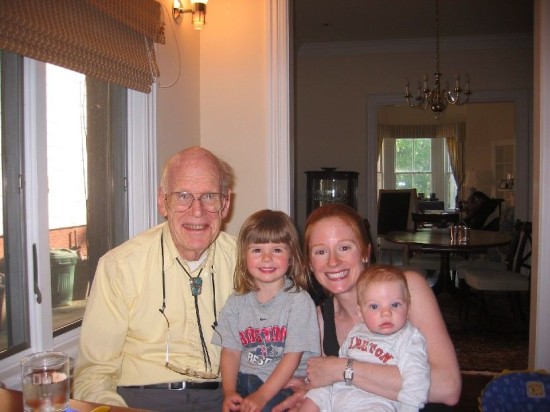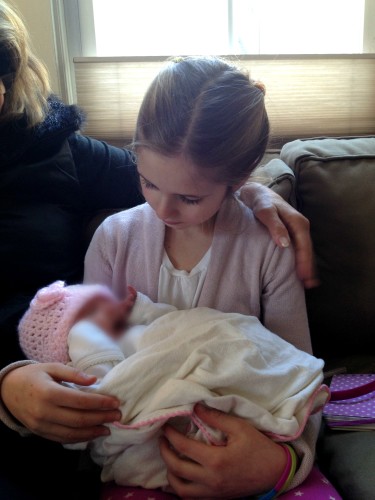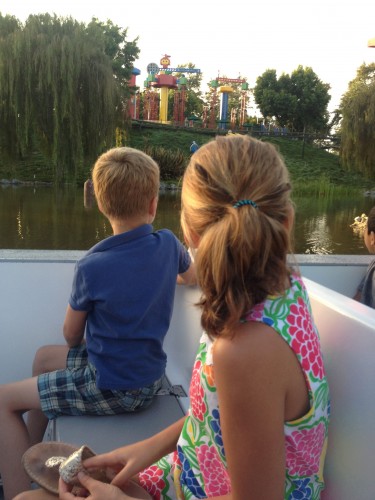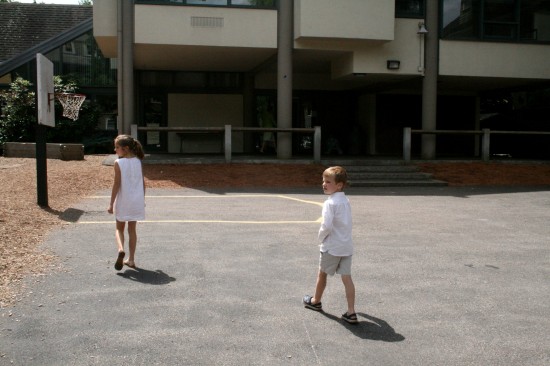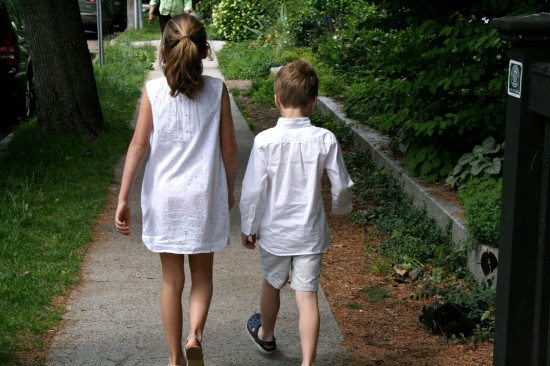Recently Chris Yeh, my friend and business school classmate, and I both lost someone very dear to us. My 94 year old grandfather died in August and Chris’s beloved 12 year-old dog passed away in September. What they had in common were long, full lives and relatively short illnesses at the end.
Chris and I didn’t know each other that well at HBS. We have developed a friendship since then that I prize highly, and it occasionally produces thoughtful exchanges like the one we had almost two years ago about optimism, the underrated virtues of melancholy, and the conundrum of memory.
Our recent conversation, about grief, the way it can derail even the most prepared people, and how we talk to our children about death, began when I commented on Chris’s thoughtful post about Kobe’s death. Chris and I are the same age, 38 (Chris is still 37 for another three weeks, he wanted me to note!), and I think that’s relevant here, as we both careen into middle age and towards the inevitable passing of the generation(s) above us. Our conversation was a powerful reminder that try as we may to prepare, life’s losses will startle and destabilize us. Here’s what we shared:
Lindsey:
So sorry, Chris. I love the way you describe Kobe, and in particular how you enriched these last few months. Xo
Chris:
Thanks Lindsey! As you know yourself, I find writing therapeutic. Writing out my thoughts helps me get them out of my head. It’s going to be a tough conversation with the kids tonight.
Lindsey:
Oh, wow. Yes, it is.
Talking to Grace and Whit about Pops’ passing was difficult because this is their first real experience of death. I found they were interested in both the enormously granular details: what does the urn look like? Do the bones burn when you cremate someone? What happens to his clothes? And in the biggest of the big picture questions, also: where does Pops go? Is he able to see Gaga (my deceased grandmother) now?
I love how you said that no matter what walls of rationality we erect, the experience of losing someone dear smashes through them. I had this experience with my grandfather’s death last month. Yes, he was 94. And of course it was not a surprise, at least intellectually. But it was still a loss, and still sad, and though I know people mean well when they point out what a wonderful and full life he had it somehow feels like they are denying the loss. I hope that you aren’t feeling that way when people comment on how marvelous Kobe’s time here was.
Chris:
It’s funny how kids fixate on the specific details. Marissa, for example, saw one of those Discovery Channel specials on one of those services that stuffs your pets after they pass away. She asked me if we could get Kobe stuffed. In the end, I decided I didn’t even want her ashes. I have many wonderful things to remind me of Kobe, including a host of photos and videos. I don’t need some carbon atoms that happened to be in her body at the end.
I do appreciate all the well wishes from friends—it’s amazing how much you hear from folks on Twitter and Facebook as well. The thing is, the people who point out what a wonderful life she had are right—she did have a wonderful life, a fact which I’m sure I’ll appreciate much more in a few weeks.
I remember writing about this at some point in time—like many people, I deceive myself into believing that I can fix anything. Whatever the problem, I can pull some strings, or talk to someone, and I can make it go away. But when cancer comes knocking, there’s no insider you can turn to, no secret treatments. It doesn’t matter how much money you have, or how many people you know.
And that’s scary as hell, especially for folks who are used to thinking of themselves as bulletproof.
Life has a way of reminding us that we’re not, and that’s something we just have to accept.
Lindsey:
I so utterly, absolutely agree. And maybe this is just a classic thing to happen in your late 30s, this reminder. I look ahead and I see so much mortality and stuff we can’t control ahead, just as I had started feeling like I have a vague handle on it. And now I am newly aware that I certainly do not.
Chris:
This year has been one long message from the world. From Kobe’s death, to my friend Don’s successful fight with cancer, to my having to walk with a cane for two months because of my own misadventure. While I’ve adamantly insisted that these are just freak occurrences, and not the signs of age, I’m starting to lose that conviction.
When I’m focused on other things, I can pretend that Kobe’s death was just a dream, and that she’ll return from a trip, same as ever. But whenever I really think about it, I can’t escape the images and memories. I notoriously hate hospitals. And no matter how kind and helpful the doctors were, all I can remember is Kobe getting weaker and weaker until finally she couldn’t even stand. That’s a concrete reality that changed how I look at the world.
I knew that Kobe would die someday, just like I know that my parents will die someday, just like I know that I will die someday. But until a week or two ago, that was an abstract, far-off knowledge. Now it’s all too real.
I’ll admit that in the past week I’ve thought about how it will feel when my parents die. I’ve even thought about my own death. I imagine that I’ll fight to the end, but if I lose consciousness, death may take me unawares.
But I’ve also learned a lot about grief and grieving. Kobe was a daily part of our lives, which means we’re surrounded by reminders of her. I decided that the best thing to do was to face them head on, and focus on the happy memories.
I placed a canvas print of Kobe above our kitchen table, so that we all see her at every meal. Quite coincidentally, I had just ordered a photobook of Kobe’s pictures—the most recent was taken the week before her death—Marissa had dressed her in a bikini top and grass skirt, and she’s looking at the camera with the same expression of patience she always had with Marissa. Both Alisha and I have taken to looking at the book every day. While it brings up the pangs of grief, seeing all those happy pictures pushes those hospital images out of my mind and lets me focus on happy memories.
Lindsey:
What you say about death being abstract until, suddenly, horrifyingly, it is concrete resonates with me. I know that a large part of my grief about my grandfather’s death was my anxiety about advancing another step on the big board game of life. Now my parents are the only generation above me. And of course this has implications for them that scare me: thinking about my parents being ill or – devastatingly – passing away absolutely cripples me. I can’t even begin to fathom what that will be like. Some of it is more selfish, I suspect, too. We grow ever closer to the top of that ferris wheel, as I often think of it. Before we know it, it will be us and just us.
Lately I’ve been thinking a lot about moving into midlife, into the afternoon of life (as Jung called it), and how my children are coming into full bloom just as I begin to sense those ahead of me fading. Not my parents, yet (and what a blessing that is) but others around me. It’s a multi-layered thing. It’s teaching my children about death. It’s watching them deal with it for the first time. It’s realizing that I can be distracted from my own grief because I’m so busy taking care of theirs. It’s learning to sink into my role as the center of a family, and accepting the sometimes-heavy responsibilities that go with that. It’s not easy, and sometimes – often – I just want to curl up on my grandparents’ couch, fall asleep, and have my young, vibrant father scoop me up and carry me to the twin bed upstairs that used to be my mother’s when she was a girl.
Chris:
One memory that has always stuck with me is the day my grandfather died. It was 1986, so I think I was 11 going on 12. My grandfather passed away quite suddenly of a heart attack while undergoing dental surgery. I was sad when my mother told me, of course, but what I always remember is when she told my father. This was before cell phones, so he had no idea that his father had passed away until my mother told him. She pulled him aside to their bedroom for privacy, so I didn’t see when she told him. When I next saw him, it was clear that he had been weeping. In my entire life, I had never seen my father cry until that day. I’m sure that he knew his father would die someday, but it was still a terrible blow.
As we rise up that Ferris wheel, I think the greatest comfort we can have is our children, and our children’s children. Think of the Bible, and its endless droning litany of descendants. Yet as I get older, I begin to appreciate the power of that litany.
Scientists tell us that as we get older, time passes ever more quickly for us. By the time we reach age 13, we’ve lived half of our subjective life (your 80th year passes a lot more quickly than your 5th). Kind of depressing. But life gives us a way to fight that passage. When I’m with Jason and Marissa, time passes much more slowly (this isn’t always a good thing!). As parents, I think we get great joy and benefit out of seeing the world through our children’s eyes. Then, as the wheel continues to turn, we see the world through our grandchildren’s eyes, and if we’re lucky like your grandfather, our great-grandchildren.
When I talk to people about parenting, I tell them, “There is no substitute for having children.” I always meant it in the economic sense of substitution, i.e. there is no equivalent experience. But now I see that having children is probably the most common yet fundamental way we have of defying the passage of time, aging, and the inevitability of death. To create life, however transitory, is the strongest statement we can make about our existence.
